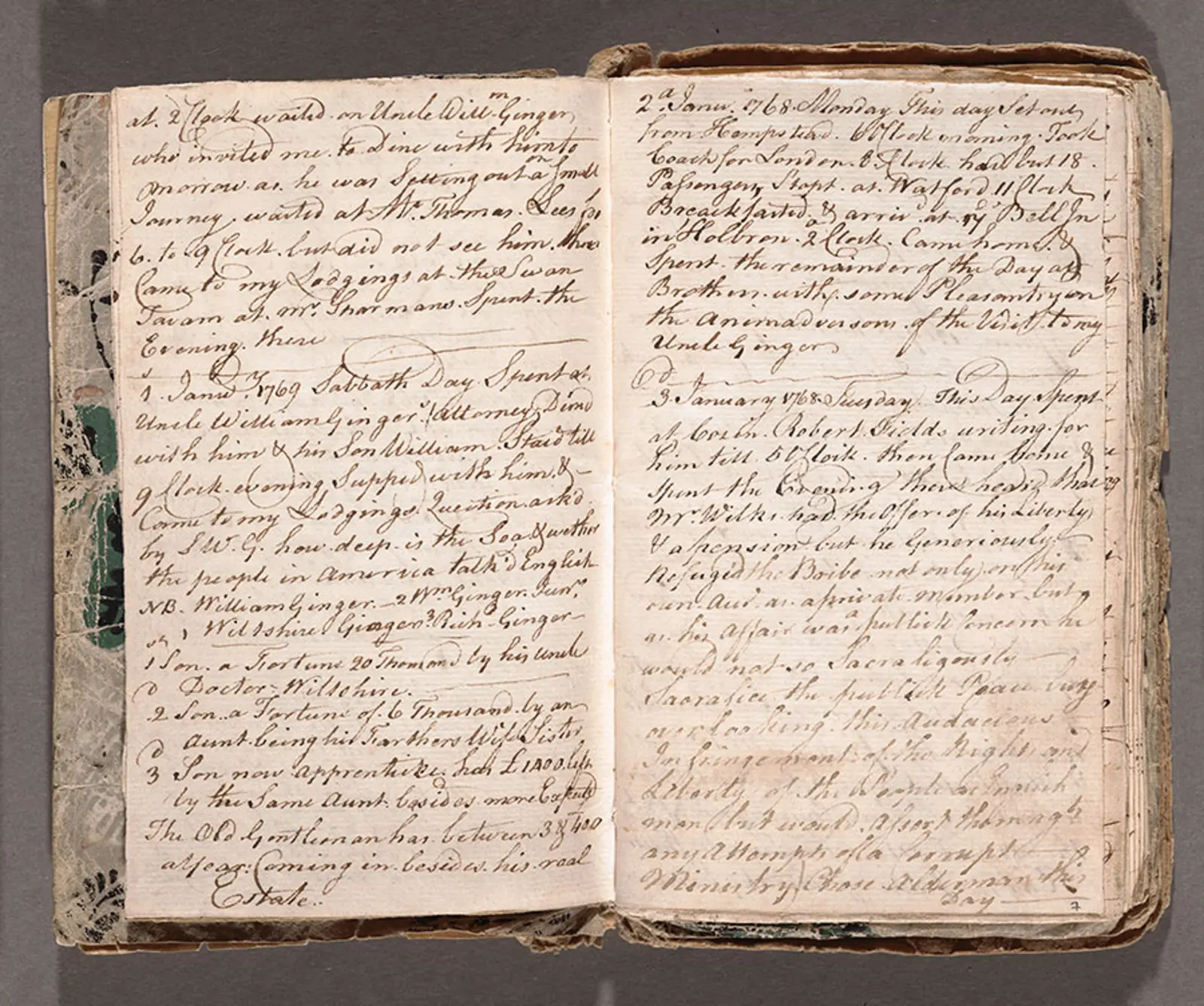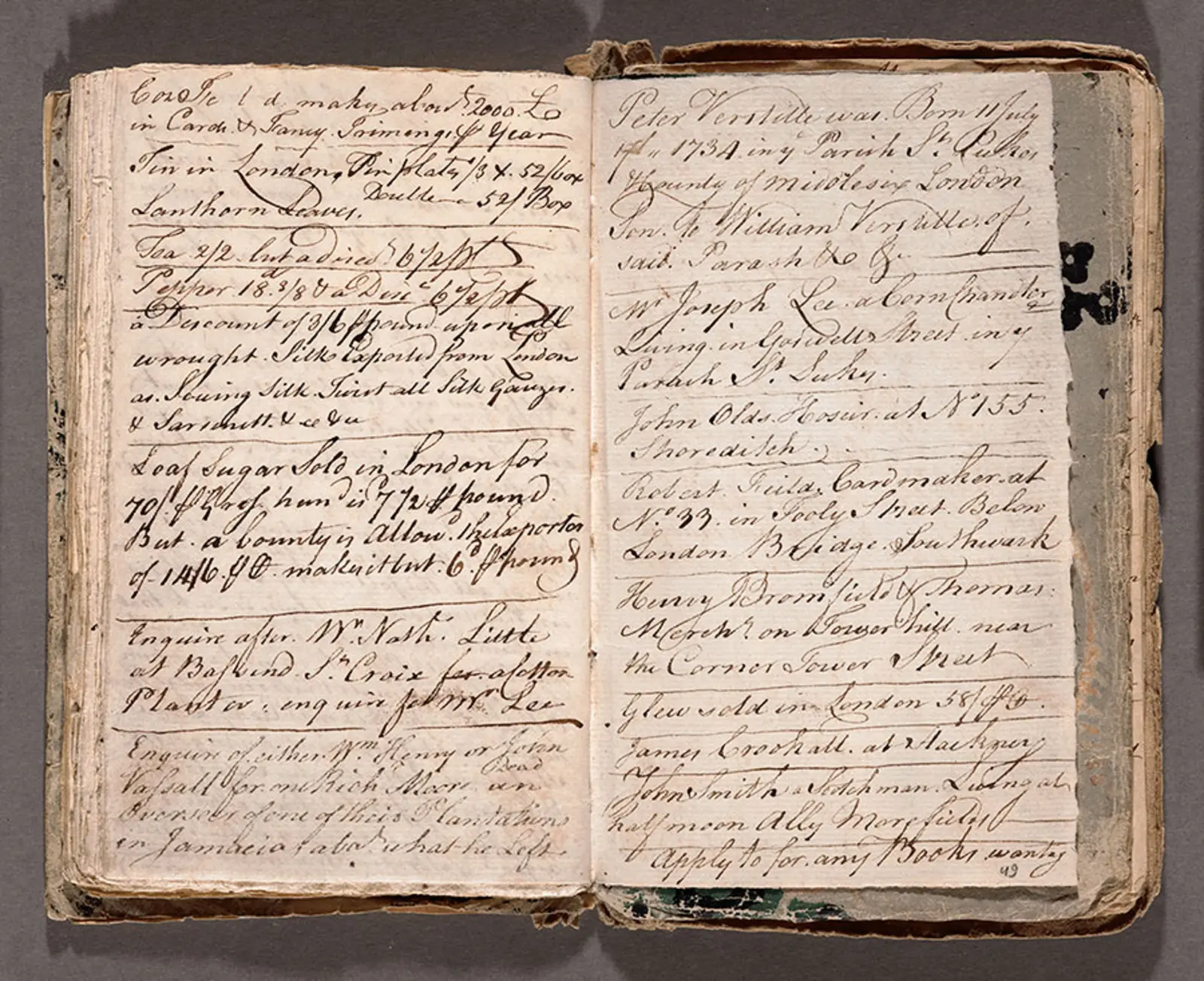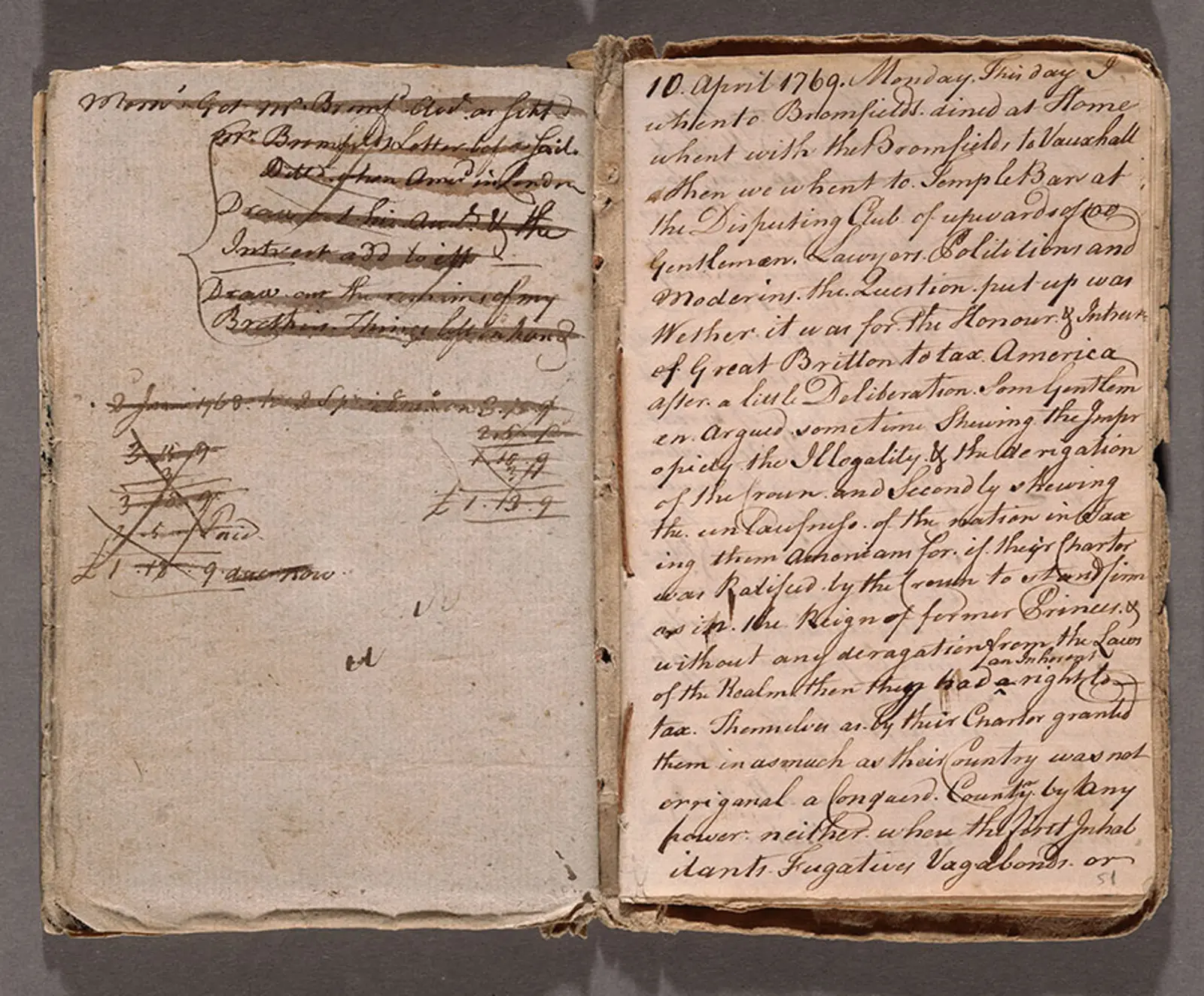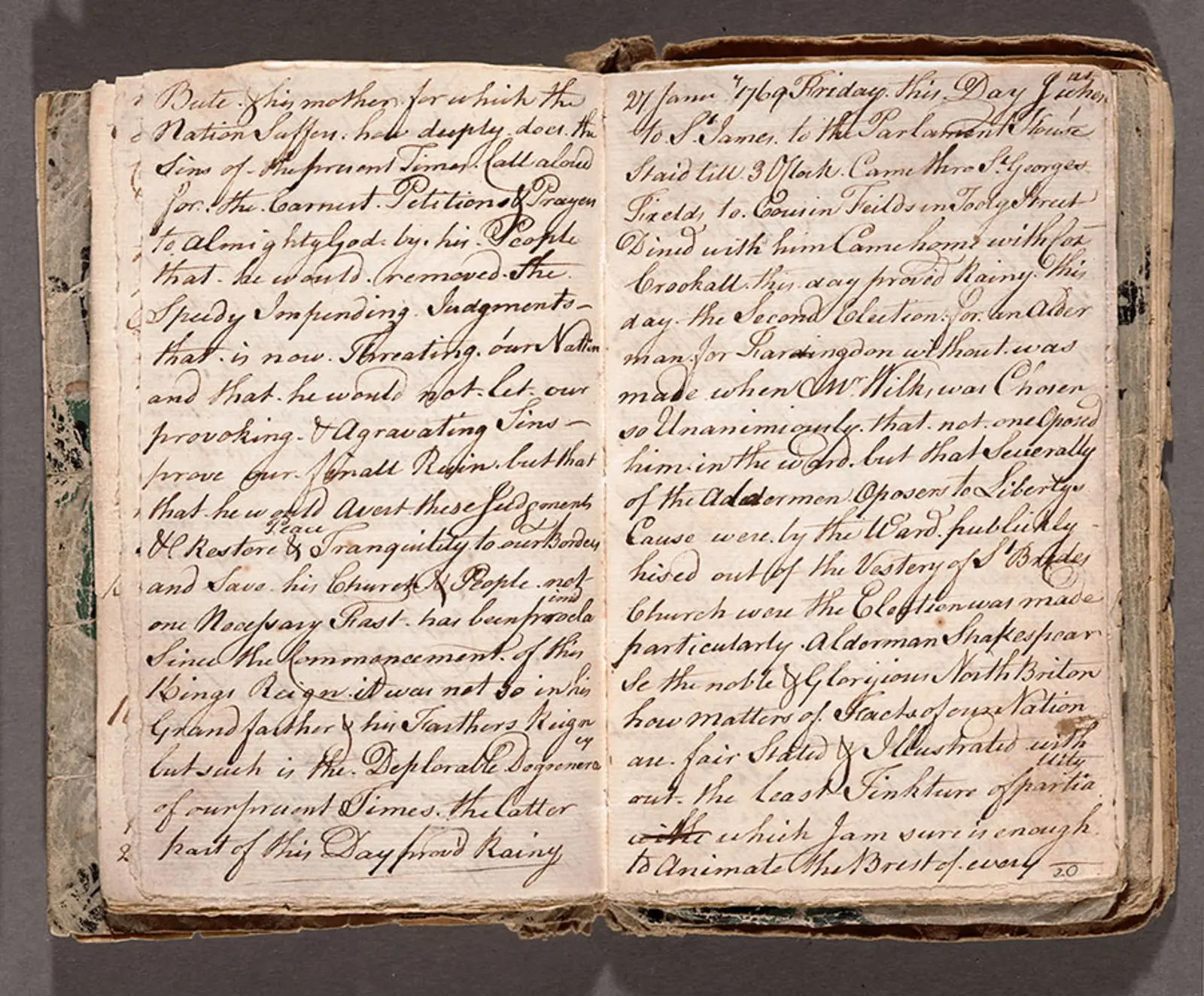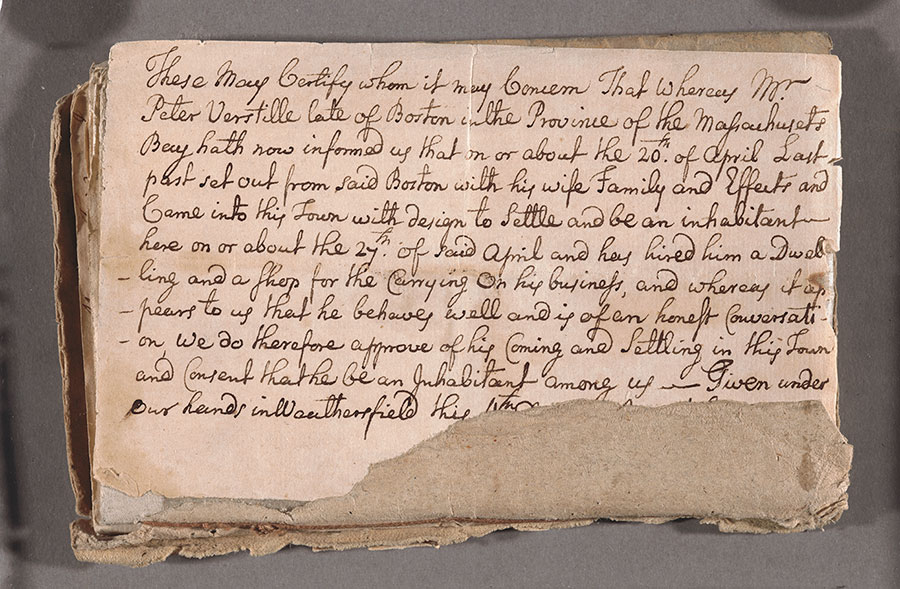
Cover of the diary and memorandum book of the Boston merchant Peter Verstille. The diarist sailed from Boston to London in September 1768, on board the Amazon. The largest portion of the diary covers his stay in London from early December 1768 to late April 1769. | The Huntington Library, Art Museum, and Botanical Gardens.
In late September 1768, two regiments of British troops sailed into Boston Harbor, ready to enforce order among the increasingly riotous townspeople. Meanwhile, aboard the ship Amazon, the young merchant Peter Verstille set sail from Boston to London. Two ships passing in the night—quite literally. For Verstille, this was intended to be a business trip to purchase English goods for his store in Wethersfield, Connecticut. But his time in London would coincide with the growing intensity of rebellious foment in North America. And from thousands of miles across the Atlantic Ocean, Verstille quickly found that “American Affairs” were all but impossible to avoid in the imperial capital.
The Huntington holds the remarkable diary of this otherwise unremarkable merchant, written over the course of his time in London from December 1768 to late April 1769. It is a small book, but over the course of 71 pages, it offers a rare first-hand account of an American colonist’s experiences in London, just as relations between Britain and her North American colonies were deteriorating.
Unlike most merchant journals from this period, 34-year-old Verstille didn’t just record business transactions or price lists. Instead, he also used his diary to capture the who, what, and where of daily life. His entries offer us a window into the excitement and hubbub of life in London, through the eyes of a religiously devout, politically engaged young man. Many days, his remarks are brief, just a few lines long. On other days—when he witnessed a particularly heated debate over American politics or attended a fiery sermon on the degeneracy of the empire—his passion spills into the diary, filling page after page. Perhaps he intended to share these recollections with others back home in New England. Equally likely, they are simply the private musings of a man trying to make sense of the changing world he saw around him.
If you wanted to find Peter Verstille on a Tuesday in London, where would you look? His diary offers a few possibilities. Most often, he could be found with family—he had, in fact, been born in London and had many relatives in the area. In one humorous entry recorded shortly after his arrival, he mentions being asked by his young nephew: “How deep is the Sea and wether the People in America talk’d English.” Clearly, migration had created some distance! But Verstille seemed eager to reconnect. His sister and brother-in-law were the center of his world, both socially and professionally. From long days of “tending” (working in) their shop, he was able to build a roster of new business acquaintances, whose names he carefully recorded in his diary. As an American merchant who relied on England for manufactured goods, he knew the power of a strong network of family and friends in the capital, and he had traveled to London with the purpose of forging one.
To this end, Verstille spent many a long morning at the New England Coffee House on Threadneedle Street. Coffee houses like this one were important spaces in 18th-century London, where men would gather over long tables to read shared newspapers, discuss politics, and form business connections. Verstille’s commitment to his favorite coffee shop ran deep: On the morning of March 29, 1769, for instance, he went there straight after the death of his niece Betsy. Jarring, perhaps, but Verstille clearly did not see his time at the Coffee House as strictly social. Important business contacts were made during those long days of socializing. He often “had some discourse about goods” with fellow merchants there, most of whom had connections to New England. Other times, he may have received tips about where to seek out the best products in London: “Mr. Joseph Lee a corn chandler living in Gaswell Street” or “John Smith a Scotchman living at half moon ally … apply to for any books wanted.” For Verstille, the New England Coffee House was a social and commercial nucleus—a space in which the opportunities of London were opened to him.
Peter Verstille’s diary and memorandum book, pages 50 and 51. Verstille was thrilled by his visits to “disputing clubs” and recorded them in vivid detail. These entries reveal his own fiercely held opinions on the illegality of parliamentary taxation in America. | The Huntington Library, Art Museum, and Botanical Gardens.
At night, Verstille could occasionally be found indulging in his passion for politics at “disputing clubs,” where perhaps hundreds of men would gather to debate current affairs. In April 1769, for instance, he sought out two “disputes” in one week, both over whether Great Britain had the right to tax America. He never spoke at these events, but he clearly found them exhilarating. They prompted some of his longest diary entries: He would begin by attempting a rough transcription but would become so enthusiastic that he would devolve into his own impassioned tirades. Britain’s recent taxation of America was not only illegal, he warned, but would “annihilate [Americans’] affections for us” and “force them to an Independence.” Five years before the outbreak of the American Revolution, Peter Verstille was already predicting that North Americans would soon “bid defiance to the power of Empire.”
Peter Verstille’s diary and memorandum book, pages 19 and 20. Verstille was dismayed by the political corruption and misdirection he perceived in London. Throughout his diary, he worried what “the Deplorable Degeneracy of our present Times” would mean for the fate of the British Empire and America. | The Huntington Library, Art Museum, and Botanical Gardens.
American politics seemed to surround Verstille in London. Indeed, his entries suggest that it was the talk of the town in the winter and spring of 1769—a keen reminder that diaries reflect the world as their writers see it. In fact, Verstille appears to have actively sought out political intrigue wherever he could find it. Despite ostensibly being in London for simple business purposes, he spent many days attending legislative sessions, collecting radical newspapers, and gleefully watching protests in the streets. His diary entries don’t mince words: He thought the British Parliament was behaving in an “abominable” and “arbitrary” manner, and he applauded what he saw as Londoners’ “almost universal hatred” of its members. For a colonist in the capital of the British Empire, it was an immense source of relief—and even pride—that Londoners apparently saw the same level of government corruption that he did.
Ultimately, what is perhaps most interesting about Verstille’s diary is the insight it gives us into what London represented to an American colonist, just a few years before the outbreak of revolution. The city was clearly a place of economic opportunity, social connection, and political excitement. But, as thrilling as it was, Verstille also seems to have found his birthplace deeply troubling. A sense of dread looms over many of his daily entries—a fear of a growing depravity and God’s displeasure with the formerly glorious British Empire. For Verstille, as for many in his day, religion and politics were inextricably intertwined. He was certain that the “enormous corruption” of the government and “heavy burthens” of taxation on the British people were direct punishments by God for their sins. “How deeply does the sins of the present times call aloud for the earnest petitions and prayers to almighty God!” he exhorted. But as he looked around him—to the Parliament in uproar, the “robberys dayly committed” on the London streets, the British troops landing in Boston—he felt a deep-rooted anxiety. Here, in the center of the British Empire, he saw more clearly than ever “the Deplorable Degeneracy of our present Times.”
Eva Landsberg is pursuing her doctoral degree in history at Yale University and is a 2022–23 Florida Atlantic University-Huntington Fellow.


